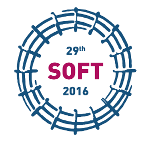Speaker
Jordi Abella
(Analytical and Applied Chemistry)
Description
Accurate and reliable tritium management is of basic importance for the correct operation conditions of the blanket tritium cycle. The determination of the hydrogen isotopes concentration in liquid metal is of high interest for the blanket correct design and operation. Sensors based on solid state electrolytes can be used to that purpose. It is worth mentioning that these type of sensors offer quick and easy to measure signals, high chemical stability and its ionic conductivity increases with the temperature.
Potentiometric hydrogen sensors based on solid state electrolytes for molten lithium-lead eutectic were previously studied at the Electrochemical Methods Laboratory at Institut Químic de Sarrià (IQS) at Barcelona. Due to the satisfactory obtained results, amperometric configuration was also evaluated. The probes are based on solid state electrolytes and are considered Proton Exchange Membranes – PEM. These electrolytes are perovskite type materials, where the electrical carriers are positive holes, excess electrons, oxide ion vacancies and interstitial protons which interact with oxide ions.
In the present work, the most promising solid state electrolytes for potentiometric sensors have been synthesized in order to be tested as PEM in the amperometric H-probe. Amperometric measurements of the ceramic elements have been performed at different hydrogen concentrations (from 0 mbar to 30 mbar), different temperatures (from 500 ºC to 650 ºC) and applying different polarization potentials to the sensor.
Co-authors
Eduard Juhera
(Analytical and Applied Chemistry, Institut Quimic de Sarria, Barcelona, Spain)
Jordi Abella
(Analytical and Applied Chemistry, Institut Quimic de Sarria, Barcelona, Spain)
Sergi Colominas
(Analytical and Applied Chemistry, Institut Quimic de Sarria, Barcelona, Spain)

